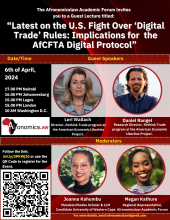Stand-Alone Posts
Category
The African Sovereign Debt Justice Network, (AfSDJN), is a coalition of citizens, scholars, civil society actors and church groups committed to exposing the adverse impact of unsustainable levels of African sovereign debt on the lives of ordinary citizens.
Convened by Afronomicslaw.org with the support of Open Society for Southern Africa, (OSISA), the AfSDJN's activities are tailored around addressing the threats that sovereign debt poses for economic development, social cohesion and human rights in Africa. It advocates for debt cancellation, rescheduling and restructuring as well as increasing the accountability and responsibility of lenders and African governments about how sovereign debt is procured, spent and repaid.
One Hundred and Fifteenth Sovereign Debt News Update: South Sudan, Nigeria, DRC, and Angola Resort to Collateralized Loans
The African Sovereign Debt Justice Network, (AfSDJN), is a coalition of citizens, scholars, civil society actors and church groups committed to exposing the adverse impact of unsustainable levels of African sovereign debt on the lives of ordinary citizens.
Convened by Afronomicslaw.org with the support of Open Society for Southern Africa, (OSISA), the AfSDJN's activities are tailored around addressing the threats that sovereign debt poses for economic development, social cohesion and human rights in Africa. It advocates for debt cancellation, rescheduling and restructuring as well as increasing the accountability and responsibility of lenders and African governments about how sovereign debt is procured, spent and repaid.
Africa’s Blue Economy: What Role for Social Sustainability?
Joining the new global rush for “Blue Gold” Uganda, a landlocked country, recently adopted its national blue economy strategy prepared with the support of the Africa Blue Economy (IGAD). From South Africa to Kenya or Cameroun, African countries, -as most States and regions around the world-, are encouraged to design Blue Economy frameworks, and other implementation toolkits, to grasp the economic opportunities offered by the extraordinary resources of oceans, seas, rivers, and lakes. As for Uganda, the Blue Economy concept is now extended far beyond the Oceans to cover all fresh waters as well as ground waters and associated resources. The African Union (AU) developed its Blue Economy Strategy from 2018 to guide sustainable development and the utilization of aquatic resources in the continent. It was endorsed, in October 2019, and is referred to in the strategic framework for the socio-economic transformation of Africa over the next 50 years, the ambitious Africa 2063. Promoted as the new gold for Africa, the Blue Economy is presented by the United Nations Economic Commission for Africa as a tool for “both coastal and land-locked States” to “harness opportunities, which could yield mutual benefits, including the provision of efficient and coordinated services to each other as well as access to resources”.
Webinar: Building Peace and Human Rights Compliance: Role of Corporate Actor
INTERNATIONAL LAW ASSOCIATION
COMMITTEE ON BUSINESS AND HUMAN RIGHTS
PRESENTS
Webinar: Building Peace and Human Rights Compliance: Role of Corporate Actors
Join the ILA Nigerian Branch Committee on Business and Human Rights for an insightful webinar on Building Peace and Human Rights Compliance: Role of Corporate Actors.
Symposium on IFFs: Perpetual Financial Drain: Assessing the Effect of Abusive Corporate Tax Practices in Exacerbating Africa's Illicit Financial Flows, Debt Burden, and Under-development
Focusing on limiting IFF is a much better option for providing African countries with the necessary funds towards achieving Agenda 2063 and the United Nations Sustainable Development Goals. Realizing tax revenue from reducing IFFs may also reduce dependence on foreign aid. As African countries take the required steps to curb IFF, it is relevant to note that no single country can independently curb Illicit financial flows, especially from aggressive tax planning. Increasing financial transparency through consistent domestic policy implementation and international cooperation remains one of the most efficient channels to halt IFFs out of Africa.
One Hundred and Fourteenth Sovereign Debt News Update: Zambia Reaches Agreement with Bondholders to Restructure 3 billion Eurobonds
The African Sovereign Debt Justice Network, (AfSDJN), is a coalition of citizens, scholars, civil society actors and church groups committed to exposing the adverse impact of unsustainable levels of African sovereign debt on the lives of ordinary citizens.
Convened by Afronomicslaw.org with the support of Open Society for Southern Africa, (OSISA), the AfSDJN's activities are tailored around addressing the threats that sovereign debt poses for economic development, social cohesion and human rights in Africa. It advocates for debt cancellation, rescheduling and restructuring as well as increasing the accountability and responsibility of lenders and African governments about how sovereign debt is procured, spent and repaid.
News: 4.5.2024
The News and Events category publishes the latest News and Events relating to International Economic Law relating to Africa and the Global South. Every week, Afronomicslaw.org receive the News and Events in their e-mail accounts. The News and Events published every week include conferences, major developments in the field of International Economic Law in Africa at the national, sub-regional and regional levels as well as relevant case law. News and Events with a Global South focus are also often included.
Call for Papers: African International Economic Law Network (AfIELN) 7th Biennial (Bridge) Conference: A Critical Appraisal of the Status and Implementation of the AfCFTA Agreement and Its Protocols
The African International Economic Law Network (AfIELN) invites the submission of abstracts for its 2024 Bridge Conference taking place in Dar es Salaam, Tanzania, from 18 to 20 July 2024.
Afronomicslaw Academic Forum Guest Lecture Series: Latest on the U.S. Fight Over 'Digital Trade': Implications for the AfCFTA Digital Protocol
April 2, 2025
Please join us for this virtual conversation on April 6, 2024.
Registration link here.
Guest Speakers:
Lori Wallach, Director, Rethink Trade Program at the American Economic Liberties Project
Daniel Rangel, Research Director, Rethink Trade Program at the American Economic Liberties Project
